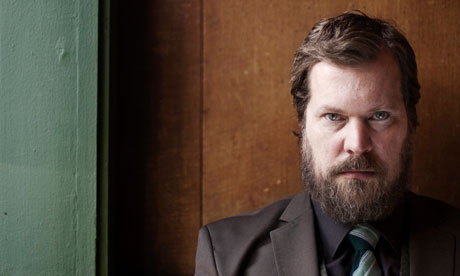
John Grant – Philharmonic Hall, Liverpool
The Great American Songbook is a canon of work that stands alone as a collection of some of the most influential and enduring songs to have permeated into popular culture in the 20th Century. In his own small, beautifully quirk-ridden way, John Grant tonight goes a long way to proving that he’s carrying the torch of those songwriters into this century and contributing to the great tradition of the US ballad. Clearly in awe of the recently refurbished and elegant surroundings of the Philharmonic Hall, the handsomely-bearded and stocky Grant is charming, reserved and quietly confident as he sidles calmly onto stage and admits he has something of an “art deco fetish” – he should be right at home in the wonderfully stylised main hall with its sleek white curves and tasteful period decoration. Joined tonight by the mass ranks of the Royal Northern Sinfonia as well as his usual band of Icelandic session musicians, the Denver native launches headlong into a two and a half hour set that leaves the audience enraptured and ultimately results in three standing ovations and several hundred dropped-jaws.
The first time Grant played in Liverpool was at the now sadly defunct Static Gallery venue to an audience of roughly eight, but the overground success of his most recent solo effort Pale Green Ghosts has seen his popularity bloom to a brimming reception at tonight’s venue. To digress slighty, this highlights another short sighted Liverpool City Council blunder as they flit from one small venue closure to the next – without our beloved smaller venues there is no room for artists like Grant to progress to filling a venue such as the Phil tonight, which is rightly held in high regard by the council and their peers as a leading light of the city’s cultural offerings; they might want to think about cutting the roots off one of their favourite trees before approving any more planning permissions such as the current debate raging around Wolstenholme Square.
Back to the performance and Grant is sublime to the point of perfection – the set is an effortless, meandering journey through years of his songwriting that sees him confront drug and alcohol addiction, struggles with his sexuality, relationship problems, existential crises and even convening with dead celebrities. The orchestral arrangements by Fiona Brice are, by and large, exquisitely executed although in places the nuances of the orchestra and band are in turn lost by a slightly ungainly front of house mix. Grant’s vocal range is envy-inducing. He traverses nauseating highs and stomach-churning low notes with ease, all the while showing a deft touch at the piano or rocking hypnotically back and forth behind the microphone dressed all in black.
The sheer enormity of tracks like debut solo album title track ‘Queen of Denmark’ is what marks Grant out as a truly gifted songwriter – an ironic, intelligent, biting showtune with a wry sense of humour and an outpouring of anger and angst that’s delivered with a crashing fury. The acerbic ‘GMF (Greatest Motherfucker)’ and the pining sorrow of ‘Where Dreams Go To Die’ show Grant at his enthralling and captivating best, the cinematic grandeur of his poetic and classic approach stemming from an outpouring of emotional honesty on lines like “You think I hate myself, but in fact it’s you I hate, because you have the nerve to make me feel”. On newer material from ‘Pale Green Ghosts’ he channels a chilling, Kubrickian reflection of Kraftwerk’s best offerings with booming electronica resonating impressively around the room. As my companion remarked enthusiastically after yet another deafening round of applause, you don’t see a show like that every day.
– Jamie Otsa
Venue: Philharmonic Hall, Liverpool
Support Band: N/A
